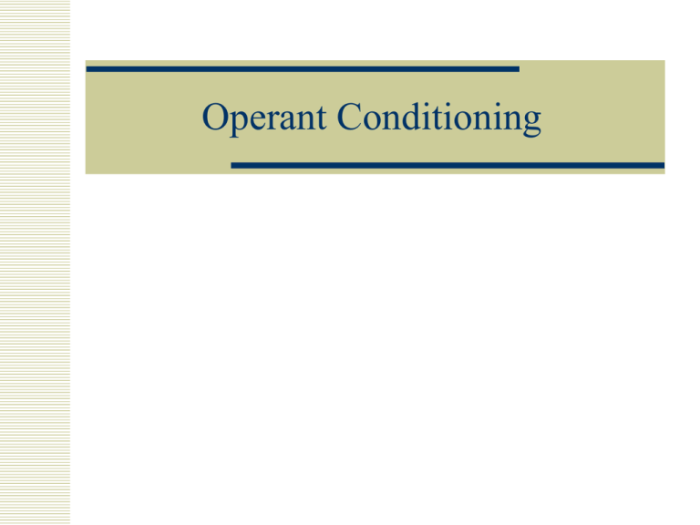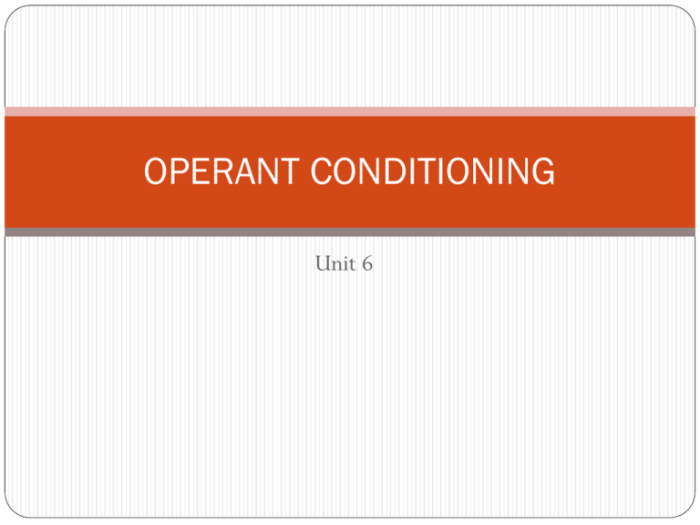Strengthening a response in operant conditioning means it will occur more frequently in the future. This principle is based on the idea that behavior is reinforced when it is followed by a positive consequence, such as a reward or praise.
By understanding the mechanisms of reinforcement, we can effectively modify behavior and promote desired outcomes.
This article explores the concept of strengthening responses in operant conditioning, discussing its significance, methods, applications, and ethical considerations. We will delve into the role of reinforcement in shaping behavior, examining the impact of frequency, consistency, and timing. Additionally, we will provide practical examples and case studies to illustrate the successful application of these principles in various settings.
Strengthening Responses in Operant Conditioning

Operant conditioning involves altering behavior by modifying its consequences. Reinforcement, a key aspect of operant conditioning, strengthens responses by increasing their likelihood of being repeated.
Reinforcement in Operant Conditioning: Strengthening A Response In Operant Conditioning Means It Will Occur

Positive reinforcement:Introducing a pleasurable consequence after a behavior increases the likelihood of that behavior being repeated.
Negative reinforcement:Removing an unpleasant consequence after a behavior increases the likelihood of that behavior being repeated.
Reinforcement increases the likelihood of a behavior by:
- Creating a positive association with the behavior.
- Increasing the chances of the behavior being repeated in the future.
Strengthening Responses through Reinforcement

Reinforcement strengthens responses by:
- Frequency:Reinforcing a behavior more frequently increases its strength.
- Consistency:Reinforcing a behavior consistently makes it more likely to be repeated.
- Timing:Reinforcing a behavior immediately after it occurs is more effective than delayed reinforcement.
Strengthening responses can modify behavior by:
- Increasing the frequency of desirable behaviors.
- Decreasing the frequency of undesirable behaviors.
- Shaping new behaviors.
Methods for Strengthening Responses, Strengthening a response in operant conditioning means it will occur
Continuous reinforcement:Reinforcing a behavior every time it occurs.
Intermittent reinforcement:Reinforcing a behavior only some of the time.
Shaping:Reinforcing successive approximations of a desired behavior.
Applications of Strengthening Responses
Strengthening responses can be used in various settings:
- Education:Rewarding students for academic achievements.
- Behavior modification:Modifying undesirable behaviors in individuals.
- Animal training:Teaching animals new behaviors or modifying existing ones.
Considerations for Strengthening Responses
Ethical considerations:Reinforcement should be used responsibly and not to manipulate or control individuals.
Potential for addiction or control:Excessive or inappropriate use of reinforcement can lead to addiction or controlling behavior.
Avoiding potential problems:Use reinforcement judiciously, avoid over-reliance, and ensure that the behavior being reinforced is appropriate and ethical.
Query Resolution
What is the difference between positive and negative reinforcement?
Positive reinforcement involves adding a desirable consequence after a behavior, while negative reinforcement involves removing an undesirable consequence after a behavior.
How does frequency of reinforcement affect the strength of a response?
Higher frequency of reinforcement leads to stronger responses, as it increases the likelihood of the behavior being repeated.
What are the advantages of intermittent reinforcement?
Intermittent reinforcement produces more resistant responses to extinction, meaning the behavior is less likely to disappear when reinforcement is no longer provided.